“Hello. My name’s Joan Tipping and I’m chair of the North Manchester Health Forum. Thank you all for coming.”
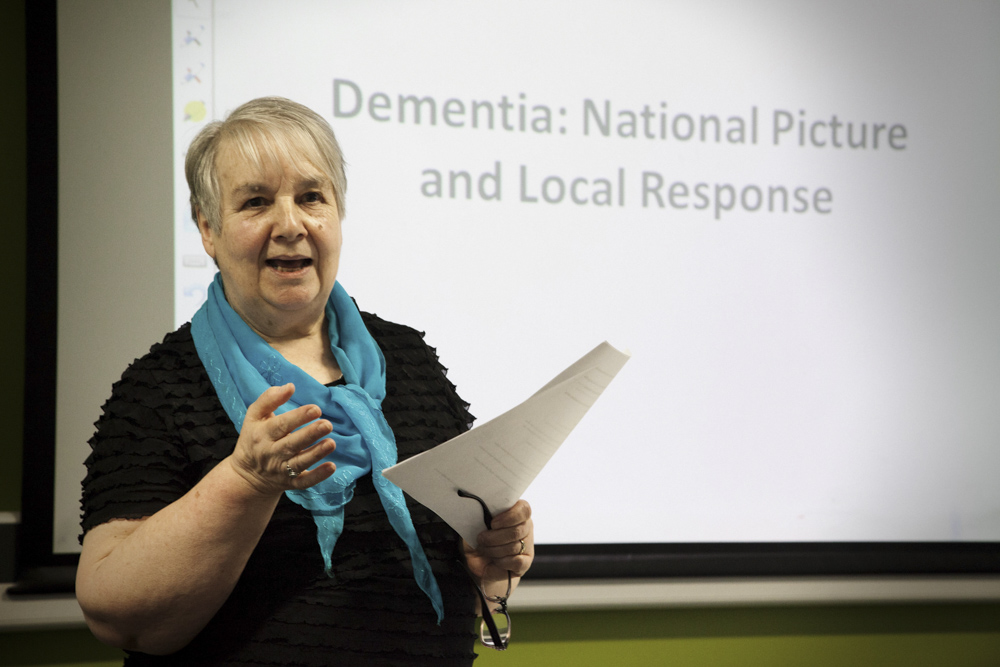 I don’t know much about Joan’s work. I thought coming to today’s Community Conference on Dementia would be a good way of finding out.
I don’t know much about Joan’s work. I thought coming to today’s Community Conference on Dementia would be a good way of finding out.
Before everyone had found their way to this community room in Manchester Communication Academy I sat down with a coffee and biscuit and introduced myself to one of the delegates.
“I’m writing about Joan because she’s a member of a local group working with Forever Manchester,” I had said to dementia specialist, Alpa Riga. It turns out that Alpa used to work with Joan in the local health trust.
“She’s now moved into the voluntary sector,” Alpa explained, “and she manages the Wellbeing Centre in Harpurhey. The centre is really influential and Joan is always up for piloting fresh ideas.”
“She’s quite a remarkable force then?”
“She is, yes, absolutely. She’s always taking on innovative new work and she’s currently looking at what the community needs in terms of dementia support.”
Joan is now telling her audience of health professionals, community representatives and carers how the Wellbeing Centre is trying to make their area more dementia-friendly. “And then, hopefully, that will spread out to other communities too,” she says.
“The reason we’re having this conference is to respond to people’s needs in a community way.”
How refreshing: listen to local people, hear what they need and tailor local services to meet those needs. Even better, support the community in finding their own, long-term solutions. It seems Joan has cottoned onto this approach long ago.
“In 1999, we set up the guided walks because people wanted a safe way of taking exercise. Those walks still happen every Tuesday afternoon. Next we set up Heart Beat, for those who had suffered a heart attack and had nowhere locally to exercise. That’s still going strong every Monday.”
Now Joan has her sights on supporting dementia sufferers and their carers.
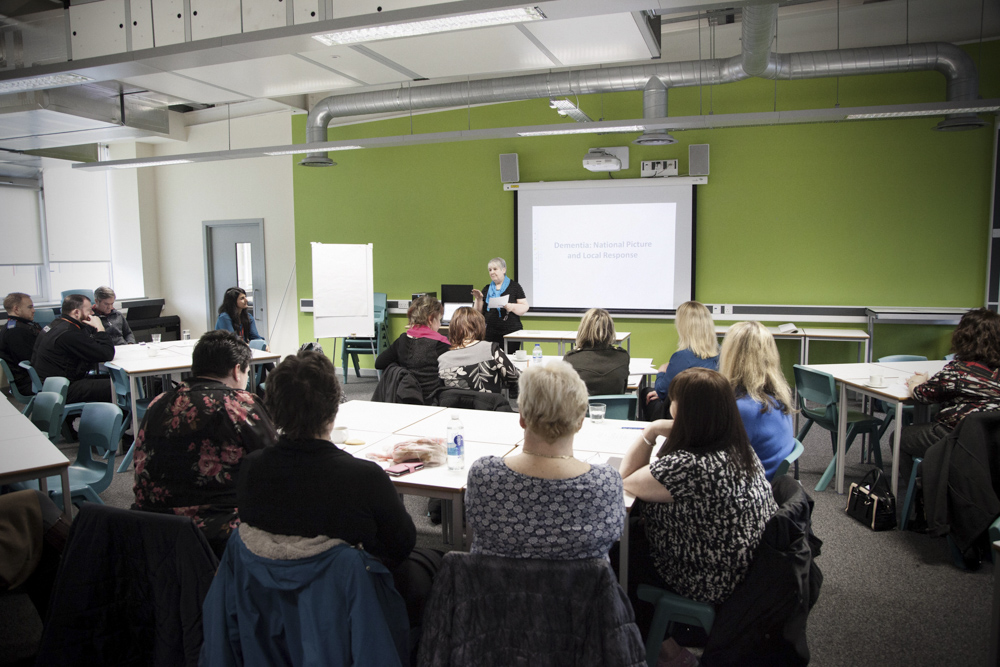 She next introduces Dr Ruth Thompson, a Manchester GP and commissioner of mental health services, who gives us an overview on dementia. “1 in 3 of the over-65s will have dementia,” she says, “and 1 in 3 of us will be involved with caring with someone living with dementia.”
She next introduces Dr Ruth Thompson, a Manchester GP and commissioner of mental health services, who gives us an overview on dementia. “1 in 3 of the over-65s will have dementia,” she says, “and 1 in 3 of us will be involved with caring with someone living with dementia.”
Which all sounds fairly depressing. “But it’s an exciting time for dementia research,” Ruth continues. “The government is committed to finding a cure by 2025 and has invested £250 million into research.”
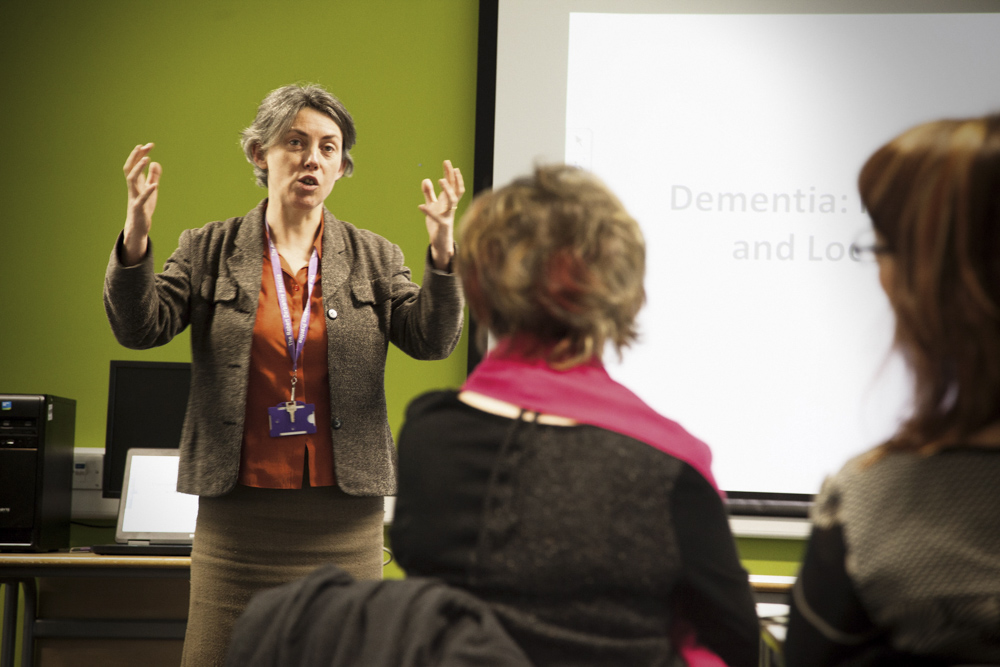 Ruth sets an upbeat tone and tells us that Manchester has some money for innovative ways of supporting dementia sufferers. This has got to be good news for people like Joan who can put it to good use.
Ruth sets an upbeat tone and tells us that Manchester has some money for innovative ways of supporting dementia sufferers. This has got to be good news for people like Joan who can put it to good use.
As Ruth rushes off, back to do her clinic, Anthony Bradley from Everyday People takes the floor. Like Joan, Anthony sits on the Local Reference Group, advising Forever Manchester how to allocate the Fourteen funding.
Joan has invited him to talk about the reminiscence work he does with older people.
“We go into sheltered schemes, residential homes and community groups where we try to facilitate stronger relationships,” he explains. “Those relationships are the key to tackling social isolation which is the cause of much ill health.”
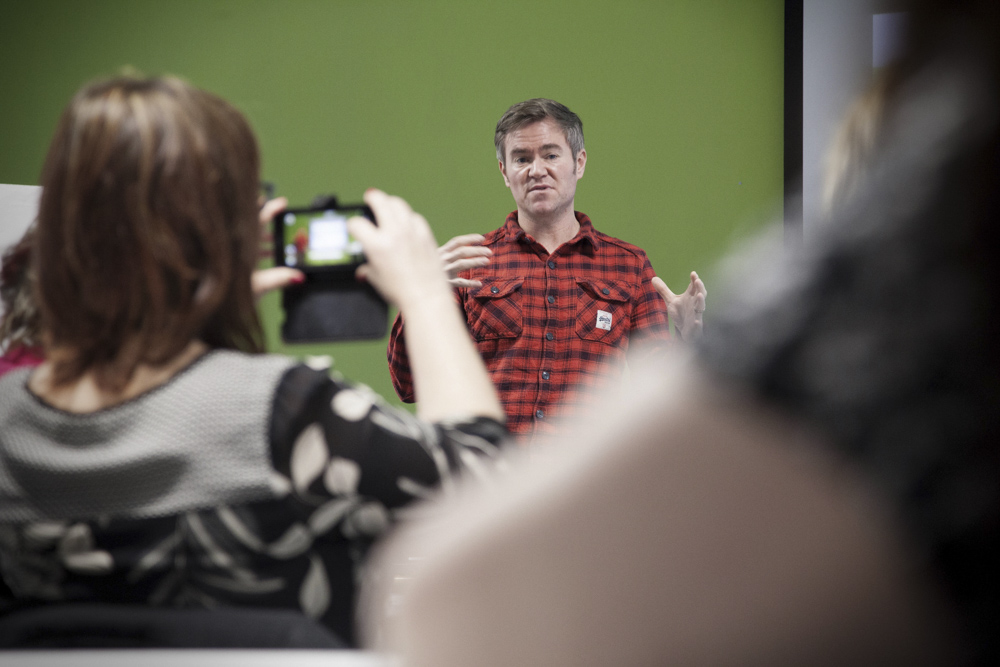 Anthony explains that music is a powerful tool in his work. “Yesterday we played songs from the musicals, from Evita, and a few of the ladies started crying.
Anthony explains that music is a powerful tool in his work. “Yesterday we played songs from the musicals, from Evita, and a few of the ladies started crying.
“At the end of the session they thanked me because the music had evoked certain emotions which they felt safe to express in that environment.”
It’s all fascinating stuff and, as I pack up my things at the mid-morning break, I make a note to chat to Joan in the coming weeks about her dementia work in this community.
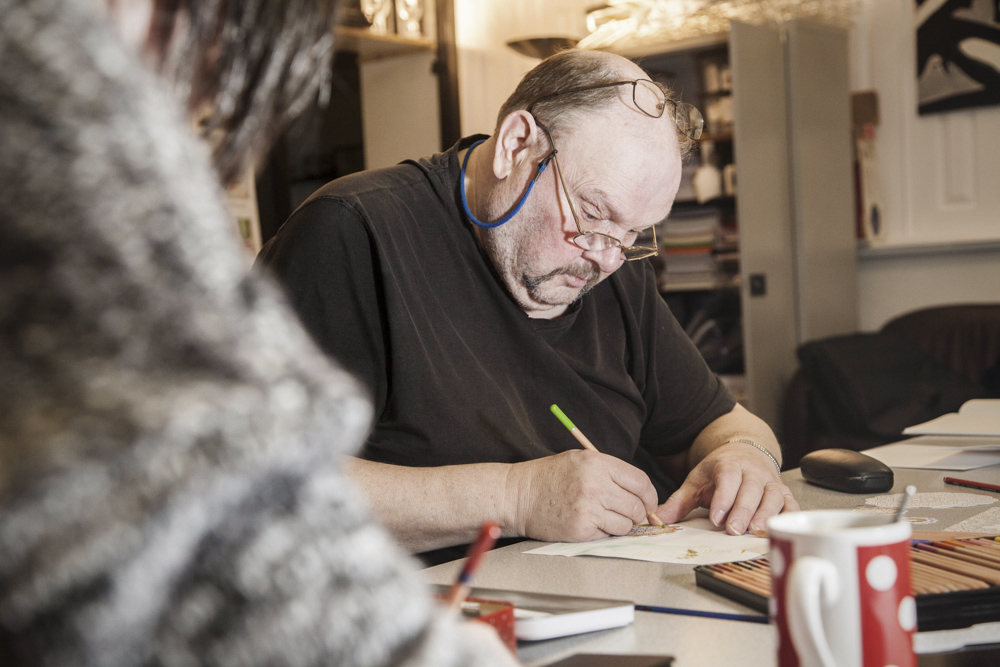 There are dozens of places like this across Manchester, thousands across the country. Small groups, surviving on next-to-no money, supported by selfless volunteers. Their compassion towards those with poor mental health or low income seems at odds with a bigger picture of insensitive cuts and austerity.
There are dozens of places like this across Manchester, thousands across the country. Small groups, surviving on next-to-no money, supported by selfless volunteers. Their compassion towards those with poor mental health or low income seems at odds with a bigger picture of insensitive cuts and austerity.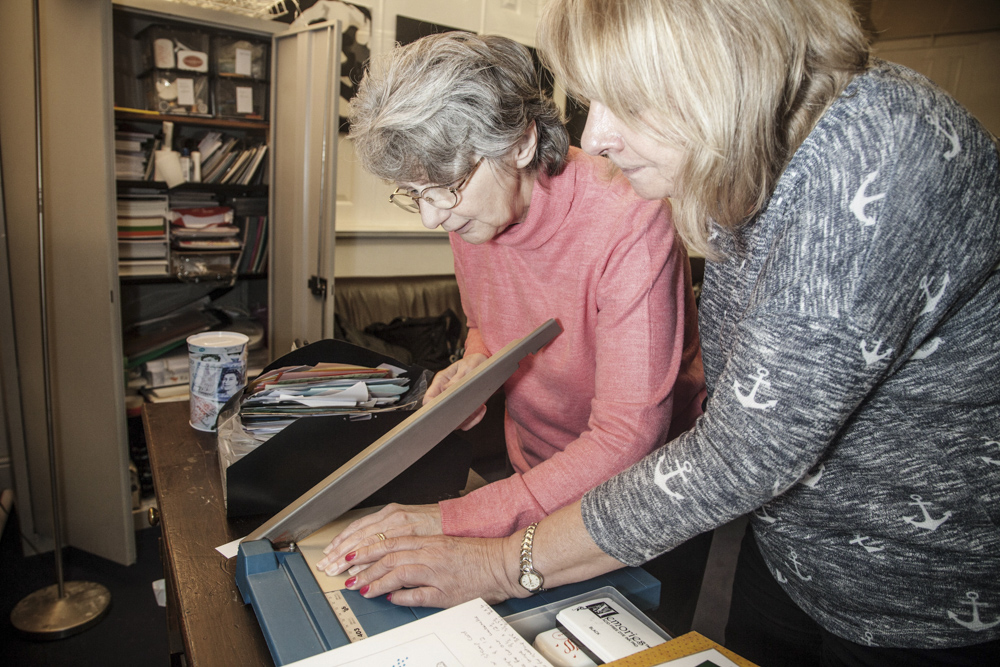 “We do rely on funding,” says Barbara, “Most people here are on benefits or low income. We charge £2 for the day but that won’t cover the rent or the materials.I’m strict about using top quality materials because I want people to be proud of what they’ve made.
“We do rely on funding,” says Barbara, “Most people here are on benefits or low income. We charge £2 for the day but that won’t cover the rent or the materials.I’m strict about using top quality materials because I want people to be proud of what they’ve made.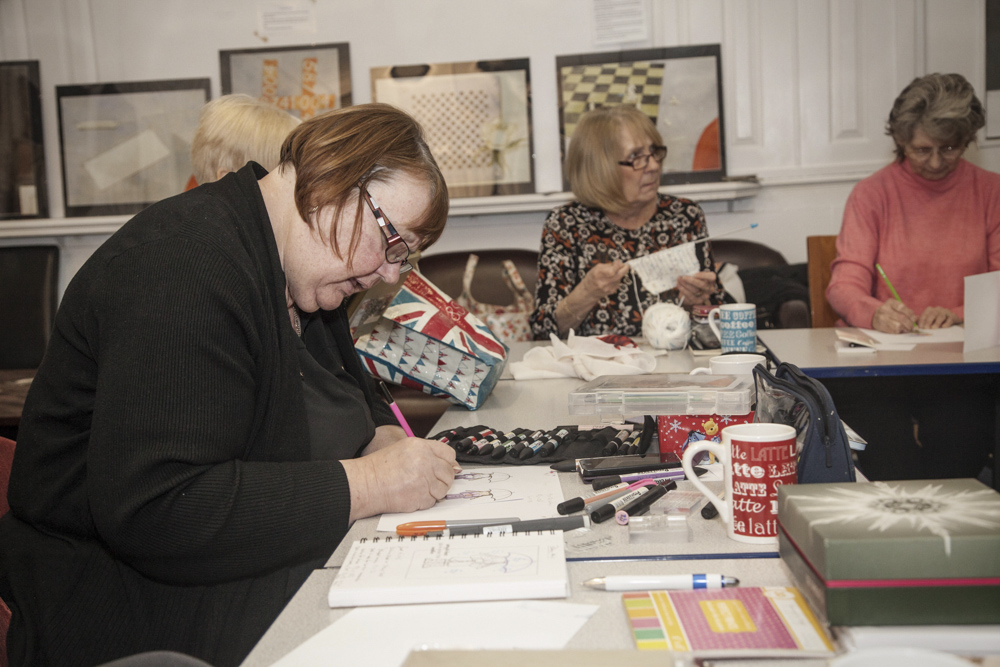 There’s Jean and Marie. And Kath ‘with a K’ clicking her knitting needles together as the others sponge pastel colours onto their artwork. Cath ‘with a C’ is the newest member of the group, recently moved from Moss Side to be near her daughter.
There’s Jean and Marie. And Kath ‘with a K’ clicking her knitting needles together as the others sponge pastel colours onto their artwork. Cath ‘with a C’ is the newest member of the group, recently moved from Moss Side to be near her daughter.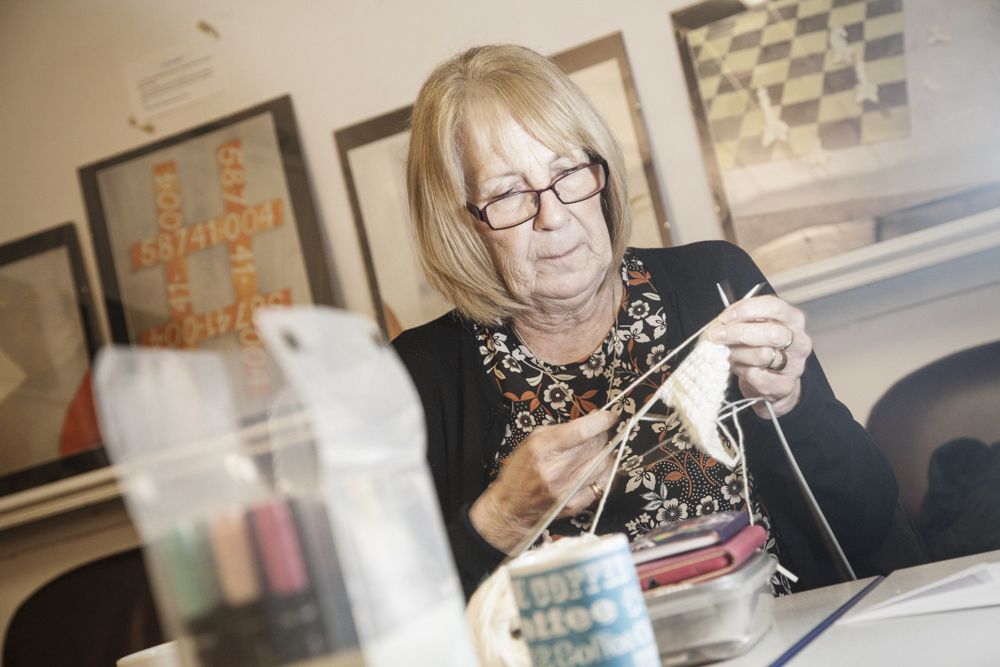 “I haven’t got the patience for all the fiddly bits,” says Kath, still clicking, “so I knit… and talk.”
“I haven’t got the patience for all the fiddly bits,” says Kath, still clicking, “so I knit… and talk.”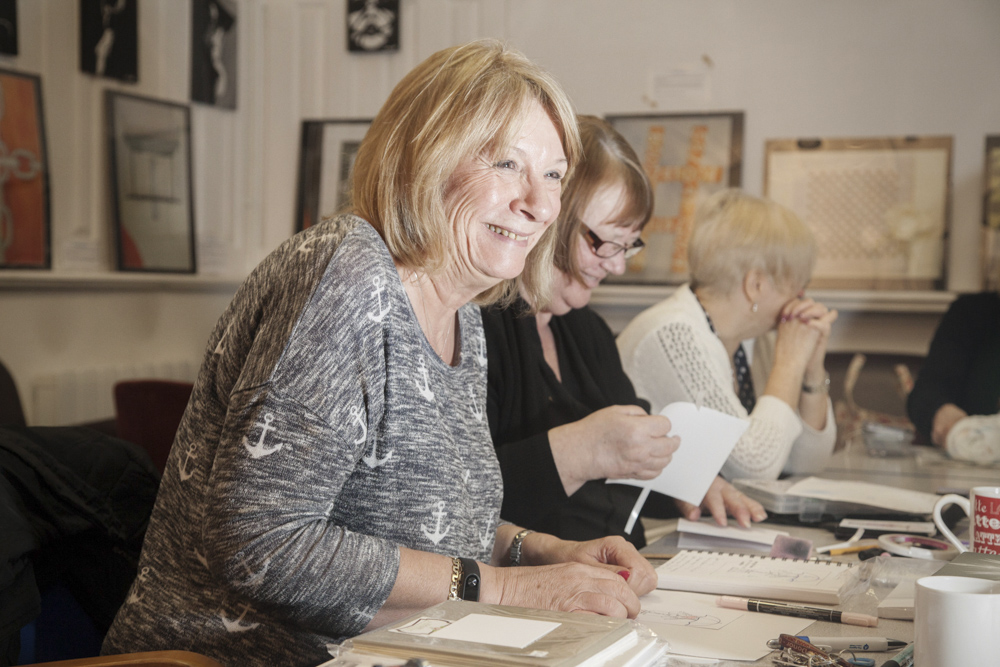 Originally from Portsmouth Barbara trained as a psychiatric nurse but later moved into community education. She worked at the Abraham Moss Centre and spent some years driving the Cheetham community bus. “So I’ve always worked with people and the community,” she tells me.
Originally from Portsmouth Barbara trained as a psychiatric nurse but later moved into community education. She worked at the Abraham Moss Centre and spent some years driving the Cheetham community bus. “So I’ve always worked with people and the community,” she tells me.